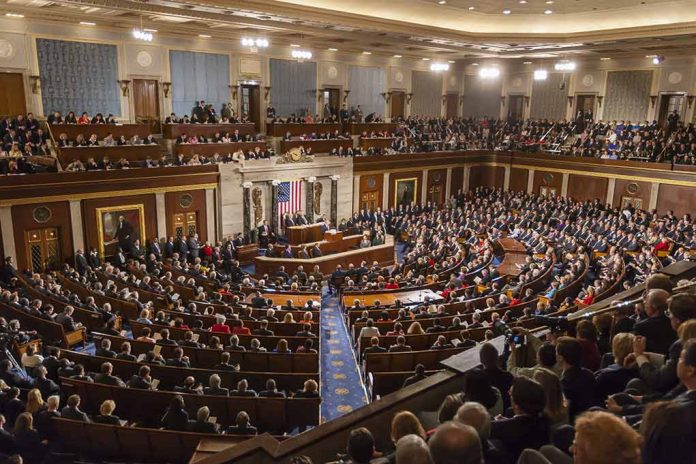
The U.S. Senate directly challenged President Trump’s authority by voting to block his tariffs on Canadian imports, setting up a showdown over presidential trade powers that threatens to expose growing Republican divisions.
Key Takeaways
- The Senate passed a resolution to block President Trump’s tariffs on Canadian imports with a 51-48 vote, with four Republican senators breaking ranks
- Senators Rand Paul (R-Ky.) and Tim Kaine (D-Va.) co-sponsored the resolution, which aims to terminate the national emergency on fentanyl that Trump used to justify the tariffs
- Key Republican supporters included Senate Minority Leader Mitch McConnell, representing a significant rebuke to Trump’s trade authority
- The resolution is largely symbolic as it faces significant hurdles in the Republican-controlled House and would likely face a presidential veto
- Sen. Paul and others argued that Canada is a critical ally, not a security threat, and that tariffs would harm American families and businesses
Senate Defies President on Canadian Tariffs
In a rare display of bipartisan cooperation, the Senate voted 51-48 to pass a resolution blocking President Trump’s tariffs on Canadian imports. The measure, co-sponsored by Senators Rand Paul (R-Ky.) and Tim Kaine (D-Va.), specifically targets the national emergency declaration on fentanyl that Trump used to justify imposing the tariffs. Four Republican senators broke ranks with the president, including Senate Minority Leader Mitch McConnell, Susan Collins of Maine, and Lisa Murkowski of Alaska, marking what some have called the most significant Republican rebuke of Trump in his second term.
The resolution represents a direct challenge to presidential authority over trade policy. Sen. Paul has been particularly vocal in his opposition to the tariffs, arguing that such measures amount to taxes that should require congressional approval. During the Senate debate, Paul emphasized Canada’s status as a key ally rather than an adversary in the fentanyl crisis, stating that the northern border is not the primary source of illegal drug trafficking.
Nobody was explaining the Senate resolution to block the national emergency declaration. It would be only symbolic without the House and a Veto-proof majority. So it sounds like tariffs will proceed.https://t.co/l1NIiSEVTL
— Warren Togami (@wtogami) April 2, 2025
Economic Concerns Drive Opposition
Concerns about economic impacts on American consumers and businesses have fueled much of the opposition to the tariffs. Several Republican senators expressed worry that imposing tariffs on Canadian goods would ultimately harm their constituents through higher prices. The resolution’s supporters argue that Canada, as America’s largest trading partner, should not be subject to emergency tariff measures, especially when the stated reason – fentanyl trafficking – primarily occurs at the southern border, not the northern one.
“We’re not at war with Canada. They’re an ally that buys more of our stuff than almost any other country in the world,” said Paul.
Maine Senator Susan Collins was particularly forceful in her criticism of the tariffs, noting their potential impact on working families in her state. “The price hikes that will happen for Maine families, every time they go to the grocery store, they fill their gas tank, they fill their heating oil tank, if these tariffs go into effect, will be so harmful. And as price hikes always do, they will hurt those the most who can afford them the least,” Collins stated. She also challenged the administration’s justification, adding, “The fact is the vast majority of fentanyl in America comes from the southern border.”
Trump Pushes Back Against Senate Move
President Trump has strongly criticized the Senate resolution, describing it as “devastating for the Republican Party” and a Democratic ploy. In social media posts, he characterized the resolution as an attempt to block “our critical Tariffs on deadly Fentanyl” and stated he would “never sign it” if it reached his desk. The White House has maintained that the tariffs are necessary to combat the fentanyl crisis and protect national security interests, despite evidence that most fentanyl enters through the southern border.
“The fact is the vast majority of fentanyl in America comes from the southern border,” Collins said.
Senate Majority Leader John Thune urged Republicans to oppose the resolution, echoing the president’s concerns about combating fentanyl trafficking. However, his appeals were not enough to prevent four Republican senators from joining Democrats in support of the measure. The vote coincided with Trump’s announcement of reciprocal tariffs on multiple nations, highlighting the administration’s broader trade agenda despite congressional pushback.
Legislative Hurdles Ahead
Despite clearing the Senate, the resolution faces significant obstacles before it could take effect. House passage appears unlikely given the Republican majority and new rules requiring the resolution to go through the committee process. Even if it were to pass both chambers, President Trump has made it clear he would veto the measure. The resolution would then require a two-thirds majority in both the Senate and House to override a presidential veto, a threshold that appears unattainable given current political alignments.
Representative Gregory Meeks has announced plans to force a similar vote in the House, though the timeline remains unclear. Some observers view the Senate vote as largely symbolic but nonetheless important in asserting congressional authority over trade policy. Senator Tim Kaine framed the issue as one of constitutional governance, opposing what he called “government by executive emergency declaration” rather than proper legislative processes.
Sources:
- The Senate just passed Rand Paul’s bill to block Trump’s tariffs on Canada
- Snubbing Trump, bipartisan group of senators votes against Canada tariffs
- Republicans join Democrats in Senate vote to rescind Trump Canada tariffs
- Senate passes bipartisan resolution to try to block Trump’s Canada tariffs



